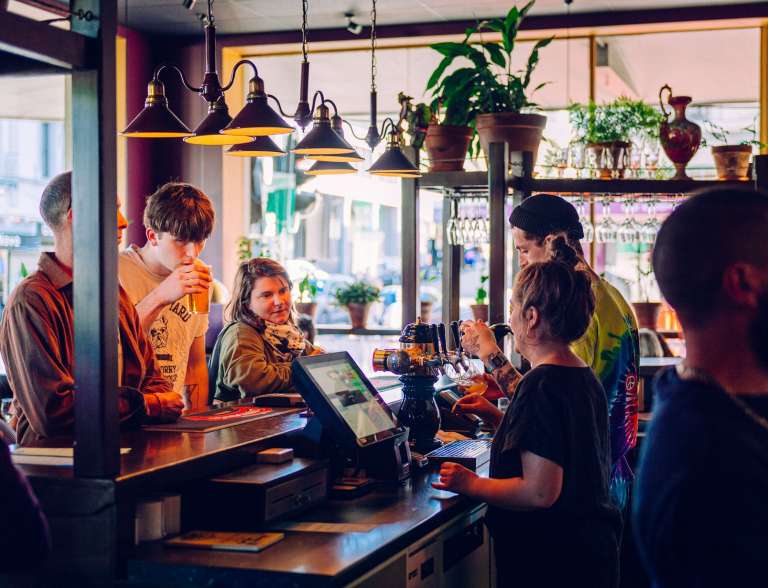As flexible working has become the norm, the hospitality industry has felt the economic impact, particularly in city centres where office workers once filled cafés, restaurants, and bars. In Wellington, the shift to remote working has been especially pronounced, with civil servants and office workers no longer providing the regular footfall that hospitality businesses depend on for their daily trade. For an industry that thrives on a bustling urban environment, the move to working from home has created significant challenges.
Impact on hospitality businesses
Hospitality businesses have made it clear: the reduction in office workers has led to a downturn in revenues. Where once the daily lunch rush, after-work drinks, and coffee catch-ups kept city-centre cafés and restaurants busy, these same businesses are now seeing reduced activity. The capital city, home to approximately 28,000 full-time equivalent civil servants, has been notably affected, as fewer people in the office means fewer customers filling the seats of local eateries.
For many businesses, this decline has been difficult to manage. With fewer customers coming through the door, the ability to generate revenue is impacted. Hospitality venues rely on the daily rhythm of office workers, and when this disappears, the entire ecosystem is disrupted.
Leading by example
The Restaurant Association has welcomed the government’s recent encouragement for civil servants to return to the office more frequently. Civil servants play a key role in city-centre economies, and by bringing them back into the office, the government is setting a vital example for the private sector to follow. In Wellington alone, the 28,000 civil servants make up a significant portion of the city’s workforce, and their presence is crucial to the economic health of the city centre. Encouraging this workforce back into offices would not only support hospitality businesses but also encourage corporates to reassess their own flexible working policies.
When government leads by example, it signals to other businesses the importance of maintaining a vibrant central business district (CBD), where both public and private sectors thrive. A return to in-office work from the public sector would help set the tone for the corporate world to follow suit, ensuring that city centres remain active, prosperous places to work, shop, and socialise.
Lobbying for change post-covid
In Auckland, the effects of remote working on the CBD have been stark. Studies revealed that around 30,000 fewer people are travelling into the city centre each day compared to pre-Covid levels. Viv Beck, CEO of Heart of the City, has been lobbying for change, emphasising the need to bring people back to the CBD to support local businesses that are still struggling to recover. The reduced foot traffic has meant that businesses in hospitality and retail are facing ongoing challenges in maintaining sales and service levels.
Auckland’s experience mirrors the situation in Wellington, where the presence of civil servants and office workers is essential to city-centre economies. As Beck has pointed out, the continued absence of workers from city centres is a significant contributor to the struggles faced by local businesses.
Striking a balance
While the hospitality industry understands the importance of flexibility, there needs to be a balance. We’re not advocating for an end to flexible working arrangements, but rather a measured approach. Working from home is essential for many, but if it becomes the default option for the majority of people, we risk losing the vibrancy that makes our cities special.
Regular office-based work not only supports local businesses but also keeps city centres alive. The decline in office presence has been cited by many hospitality businesses as a key factor in their struggles. By encouraging more workers back into the office—whether that’s a few days a week or on a more regular basis—we can begin to restore the economic health of these vital urban hubs.
In the end, the goal is to find a balance that allows flexibility for workers while ensuring that city centres—and the businesses that rely on them—can flourish. A thriving hospitality industry is essential to vibrant cities, and bringing workers back into offices is a crucial step in supporting that.

Checking it Twice – Health and Safety Considerations for your Work Function
Why the hospitality industry supports a return to the office
Surviving Financial Strain: Restructuring Strategies for NZ Hospitality Employers
Rent Reviews Unveiled: The Ultimate Guide for Hospitality Tenants
The Vital Role of Reputation Management in the Hospitality Industry
Covering Your Bases: A Comprehensive Guide to Business Insurance in New Zealand
Understanding Trial Periods

 Member only content
Member only content

Checking it Twice – Health and Safety Considerations for your Work Function
Why the hospitality industry supports a return to the office
Surviving Financial Strain: Restructuring Strategies for NZ Hospitality Employers
Rent Reviews Unveiled: The Ultimate Guide for Hospitality Tenants
The Vital Role of Reputation Management in the Hospitality Industry
Covering Your Bases: A Comprehensive Guide to Business Insurance in New Zealand
Understanding Trial Periods